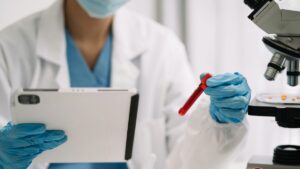Dr Boreham’s Crucible: Putting Microba under the microscope

Tim Boreham is one of Australia’s best-known small cap analysts and business journalists.
It’s easy to get the impression that the bloke upstairs is trying to knock us all off – one way or the other.
Following the pandemic, gastroenteritis has made a strong comeback as we discard masks and return to normal socialisation.
But while we’ll be hearing more about nasty tummy bugs – usually from victims staying close to a bucket – spare a thought for the trillions of good ‘germs’ that inhabit the large intestine.
These bodily warriors help digestion and perform other crucial tasks. When harnessed, they can treat inflammatory and immune disorders.
That’s the selling point of Microba (ASX:MAP), which listed on Tuesday on the back of its tests enabling consumers, clinicians and researchers to measure the gut microbiome.
As well as moderating disease and digestion, the clever bugs produce neuro-transmitters that can affect the brain, as well as metabolites that work systemically thought the body and impact various organs and systems.
“The big finding over the last decade has been that we have gone from ‘any bug is a bad bug to be wiped out with antibiotics’ to understanding the intimate relationship between these organisms and our health,” says Microba CEO Luke Reid.
Central to Microba’s story is a large databank of microbiomes, which the company has accumulated over the last four years. This depository is helping the company to develop therapies for chronic conditions such as inflammatory bowel disease (IBD), which affects more than six million people.
Microba under the microscope
Microba was formed in 2017 based on intellectual property acquired from the University of Queensland.
Also involved were the University of California Berkeley, Massachusetts Institute of Technology and the Joint Genome Institute.
Having attempted an initial public offer (IPO) two years ago, Microba listed on April 5 after raising $30 million at 45 cents apiece.
Microba’s tech was developed by co-founders Prof Philip Hugenholtz and Prof Gene Tyson. The latter is an executive director and the former chairs its scientific advisory board.
With a PhD in molecular biology, CEO Luke Reid has a research and commercialization background. He was an associate director of Uniquest Pty Ltd and, before that, held roles at plant geneticist Dupont Pioneer.
Dr Reid met the two professors at Uniquest while working on unrelated tech and the rest – as they say – is history.
The company launched its first product, Microba Insight, in Australia in July 2018.
In 2019, it followed up with a gut microbiome measuring product, Metabiome, for healthcare professionals in Australia and New Zealand through a distribution partnership.
The company’s deputy chair, Prof Ian Frazer needs no introduction as the co-inventor of the Gardasil and Cervarix cervical cancer vaccines.
The guts of the company
Microba has three arms: microbiome services (testing), drug development and a proprietary database of 1.2 million microbial genomes covering 5,000 species.
The last will enable the company to “identify novel and therapeutic leads not identified by others”.
To date, Microba has sold more than 20,000 microbiome test reports.
Consumers buy the test online and send back a stool sample, for which they receive a summary of their gut microbiome.
Users outside of a healthy range are provided with dietary recommendations or access to an accredited dietician.
Microba has rolled out the tests via distribution partners: Metagenics in Australia, Psomagen in the US and Europe’s biggest pathology company, the German-listed Synlab.
Microba is about to launch a testing partnership with Genova Diagnostics in the US and has just signed a Middle Eastern compact with artificial intelligence outfit G42.
The company is also signing new partnerships in Japan, the UK and Taiwan.
Dr Reid describes the distribution model as “very high margin and very scaleable”.
In effect, he says, Microba is the “Intel chip”. This means the company delivers the raw data and the tech to deliver a useful report. The partners do the sales, marketing, distribution and processing.
On the therapeutic side, the inflammatory bowel disease trial is due to start in late 2022.
Other potential targets are colon cancer, diabetes, non-alcoholic steato-hepatitis (Nash), Alzheimer’s disease, rheumatoid arthritis, anxiety and depression.
Microba has an agreement with the Bill Gates-backed, New York-listed Ginkgo Bioworks to address three autoimmune conditions.
Getting to the bottom of it
Squeamish folk should look away now, because the first proof-of-concept of the healing power of gut bugs involved a faecal microbiome transplant. As the name suggests, this involved anally injecting the poo of healthy donors into diseased patients.
Not surprisingly, several parties have tried to dignify the process by freeze drying the faeces and encapsulating the material.
But Dr Reid says there are “significant manufacturing challenges” in the process.
“They are acting blindly because they are not sure if the organisms work,” he says. “Microba is third generation in that we hone-in on key organisms and develop single strain monoclonal therapeutics.”
This means the therapies can be more readily manufactured and scaled up in a high-dose format.
In the clinic
The first clinical cab – or Uber – off the rank is an upcoming trial for mild to moderate ulcerative colitis.
The company has chosen this one because there’s a significant unmet need, with patients suffering frequent flare-ups.
“Most of the [existing] drugs can only treat the downstream inflammation, they are not getting to the core of the disease,” Dr Reid says.
“We have discovered a key organism that not only deals with inflammation, but promotes activity in epithelial restitution [wound healing of the ulceration in the gut].”
Due to kick off in December, a phase Ib trial will enrol 20 to 30 patients in two parts (healthy and diseased).
While Microba’s key focus is on inflammatory bowel disease (IBD), the company is also interested in immune-oncology: enhancing the effectiveness of checkpoint inhibitors such as Keytruda.
Dr Reid says this drug class is great when it works, but 70 percent of patients don’t respond.
Big pharma is trying to work out why and a key factor is the gut microbiome.
Microba is doing a large study with cancer centres across the US and Australia, to identify the key organisms that identify the responders and non-responders.
Other studies have shown that if the faeces of a responder are implanted into a non-responder, the latter becomes responsive because of the altered microbiome.
The trouble is, this method is not scaleable. Oh, poo!
Finances and performance
The IPO ascribed an initial market capitalization of $123 million, with the shares issued at 45 cents apiece. The first day was a bit of a fizzer, with the shares trading between 34 cents and 44 cents.
Microba chalked up revenue of $2.2 million in the first (December) half-year, which derived from selling testing services to consumers, healthcare practitioners and research entities (such as biotech and food companies).
The IPO was not general, meaning it was covered by existing shareholders and new institutions and high net worth individuals.
The fund managers on board include the Sydney’s Alium and Melbourne’s ubiquitous Thorney Investments. Gingko has a four percent holding and is also entitled to a $US3.5 million ($A4.6 million) research and development fee, payable in Microba shares or cash, 15 to 24 months after the IPO.
The company plans to use the $30 million raised on drug research ($13 million), sales growth via partnerships ($7.2 million), platform technology ($2.5 million) and working capital ($2.5 million).
The lowdown on probiotics
Microba’s work is more than relevant to the trendy field of probiotics: micro-organisms that are claimed to benefit the gut when ingested.
Probiotics fall into the ‘generally recognized as safe’ category. In other words, they will not kill you, but may not necessarily benefit you.
Most consumers would be unaware that probiotics aren’t one of the naturally occurring gut bugs: typically, they derive from dairy sources such as cheese, milk and yoghurt.
Dr Reid dubs the booming sector as ripe for disruption, given the poor disclosure and lack of clinical evidence to support the loose ‘health and wellness’ claims.
“We believe the next wave of evidence-based probiotics will be the organisms that naturally are part of the adult human gut,” Dr Reid says.
Probiotics aren’t sourced from the natural gut microbiome because exogenous sources can tolerate oxygen and are thus easier to make.
Human gut bugs need to be grown in low to zero oxygen conditions and manufacturing techniques to enable this are only just emerging.
“About 70 percent of the gut microbiome has not been brought into human culture in a lab,” Dr Reid says.
“That’s a really important step that’s been a barrier for producing registered therapeutics and we have been able to overcome that.”
Dr Boreham’s diagnosis:
Ubiquitous research house Frost and Sullivan estimates the size of the microbiome testing market at $US4.89 billion and forecasts it to grow to $US6.7 billion by 2023, a compound annual rate of 7.5 percent.
“But we increasingly are seeing more players come into the market,” Dr Reid says.
“Everyone wants to jump in and take a piece of it. It will come down to the best technology and execution and that’s where I believe we have a significant edge.”
Ultimately, Microba expects to be taken over by big pharma or enter a partnering deal: the prospectus lists recent transactions between $US500 million and $US1.5 billion for early-stage plays.
A potential share price catalyst is US Food and Drug Administration approval of what would be the first microbiome-based therapy, for recurrent Clostridium difficile (a germ that causes colon inflammation).
This proposed drug has passed phase III testing by Seres Therapeutics and Ferring Pharmaceuticals.
Ultimately, Dr Reid expects microbiome testing to become as routine as blood testing and treat a range of inflammatory and mental health disorders.
Of course, Keytruda’s owner Merck would be salivating if checkpoint inhibitors could be made to be more effective.
Dr Boreham is not a qualified medical practitioner and does not possess a doctorate of any sort. Next time he wants to skive off work with a tummy bug, he’ll tell his boss there’s a trillion reasons why.
This column first appeared in Biotech Daily.
UNLOCK INSIGHTS
Discover the untold stories of emerging ASX stocks.
Daily news and expert analysis, it's free to subscribe.
By proceeding, you confirm you understand that we handle personal information in accordance with our Privacy Policy.








